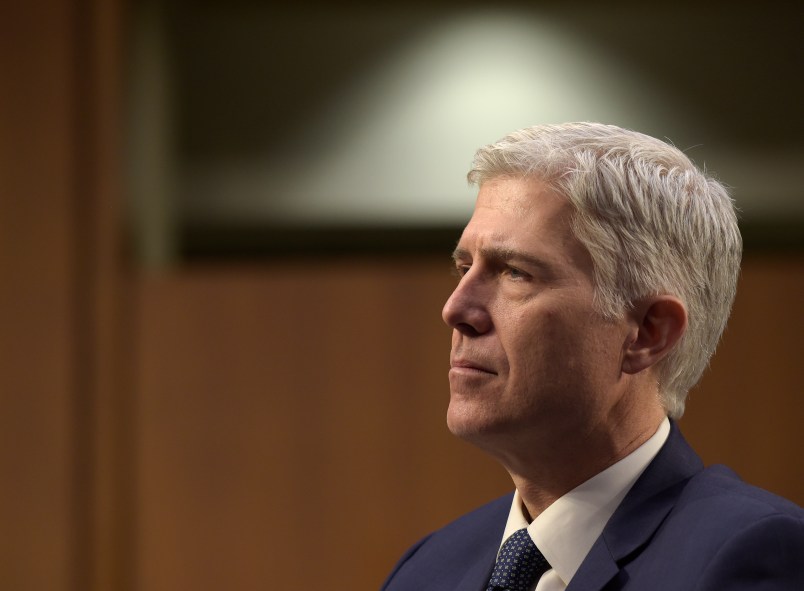Sen. Richard Blumenthal (D-CT) tried very hard to get Neil Gorsuch to tip his hand on abortion. It didn’t work.
The two engaged in a lengthy back and forth Wednesday about what Gorsuch would and wouldn’t say about key Supreme Court decisions concerning personal privacy. Blumenthal attempted to lead Gorsuch down a path that would illuminate how the judge would rule on abortion, but Gorsuch resisted mightily — reiterating his respect for the decisions as precedent but withholding deeper engagement with them.
The first, a non-privacy case, was Brown v. Board of Education, the landmark case that ended school segregation and rejected the the doctrine of “separate but equal.” Blumenthal asked Gorsuch if he agreed with its finding.
Gorsuch called it “a seminal decision” that “corrected“ a “deeply erroneous” interpretation of law, stopping short of saying he agreed with it. After some nudging from Blumenthal, who reminded him that Chief Justice John Roberts said as nominee that he agreed with it, Gorsuch submitted that there was no “daylight” between what he and Roberts said.
The second case was Griswold v. Connecticut, a decision that cemented a right to privacy by invalidating bans on contraceptive use within marriages.
Gorsuch said that the “reliance interests surrounding it are obvious and strong,” that it had “been repeatedly reaffirmed,” but refused to say whether he agreed with it.
“It is not whether I agree or disagree with any particular precedent. That would be an act of hubris. Because a precedent, once it’s decided, it carries far more weight than what I personally think,” Gorsuch said.
And so the dance went on. Loving v. Virginia, the decision that struck down bans on interracial marriage? “Seminal, important.” Lawrence v. Texas, the decision that established privacy rights to consenting same-sex couples? “A holding of the United States Supreme Court due all the weight of precedent.”
And this went on through Blumenthal reaching his destination: Roe v. Wade and Casey v. Planned Parenthood, which declared and reaffirmed a woman’s constitutional right to an abortion.
“You’re declining to be more direct and give the same answers about these cases as you did about Brown leaves doubt in the minds of millions of Americans who rely on privacy rights. They are relying right now. And I think that that doubt is regrettable,” Blumenthal said.
But Gorsuch, redrawing the same line he had all week long, said that commenting on them in this context would hinder his abilities as a judge.
“For a judge to start tipping his or her hand about whether they like or dislike this or that precedent would send the wrong signal and send a signal to the American people that the judge’s personal views have something to do with the judge’s job,” he said.







The Supreme Court today UNANIMOUSLY handed this fake lawyer his head by rejecting his assault of the education of handicapped children. Even Thomas!
Dogs all around Capitol Hill are howling and covering their ears to try and make the whistling stop. Gorsuch knows, as do the senators, that the Roberts court has no respect for any precedent that gets in their way. Some day while Gorsuch is on the bench, a whites-only charter school case will come up, and Gorsuch will vote to overrule Brown in an instant.
(Okay, not quite whites only, just, erm, kinda disproportionate.)
Can Gorsuch–or any nominee–be asked, not for his personal feelings about a given decision, but whether he thinks the case in question was rightly decided? Seems to me there’s a difference between the two. Don’t the committee members want to get at the candidate’s thinking? How he judges? What he thinks is good argument?
I’d also like to know on what he based his decision in the case the Supreme Court just invalidated. They called it a wrong decision. How does Gorsuch defend his decision?